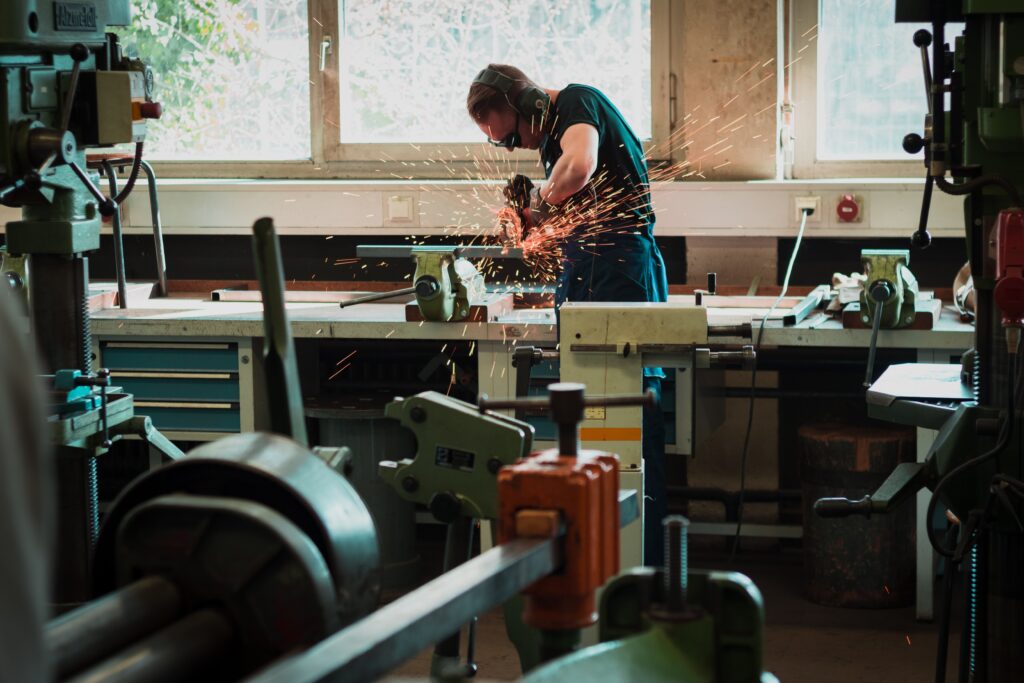Imagine dedicating years of hard work to master the art of joining metal, enduring the heat and sparks as you perfect different welding techniques. Your dedication is reflected not just in the fatigue that sets in at the end of each day, but also in the wear and tear on your body over the years. One might naturally wonder, “What age do most welders retire?” The answer may vary and it is as complex as the welding profession itself. This piece will shed light on that, detailing factors such as physical demands, industry standards, and various personal choices that influence when most welders choose to hang up their helmet for good.

Understanding the Welding Career
Welding is a skilled profession that plays a vital role in our society. Without welders, there would be no skyscrapers, bridges, cars or ships – indeed, the world as we know it would look quite different. In simple terms, welding involves the fusion of metal parts using high heat to form a solid connection. It’s a career that demands precision, patience, physical strength, and a keen understanding of diverse metals and their properties.
Overview of the welding profession
A career in welding opens up a world of opportunities. Welders are in high demand all around the world, in industries ranging from construction and automotive manufacturing, to aerospace and underwater operations. The variety of projects and working environments that welders encounter on a daily basis is one of the many unique aspects of this profession. Welders operate advanced machinery, use intricate technical skills, and work with a wide range of materials.
Required skills and qualifications
Being a successful welder requires a specific skill set. You must be extremely detail oriented, have solid math skills, and be proficient in blueprints and technical plans reading. As welding is a hands-on job, good manual dexterity is essential. Additionally, a comprehensive understanding of different kinds of metals, welding equipment, and safety measures is crucial. In terms of qualifications, most welders have a high school diploma and undergo technical training, often obtaining certifications in different types of welding.
Potential paths in welding career
The welding career offers various paths. Some welders opt to specialize in a specific industry like automotive welding or underwater welding, whereas others prefer to acquire skills in a multitude of welding techniques. Moreover, with experience, welders can progress to supervisory roles, teach apprentices, or even start their own welding businesses.
Average lifespan of a welder’s career
The average lifespan of a welding career varies considerably, depending on factors such as specializations, working conditions, health, and personal career goals. While some welders continue working well into their 60s, others may choose or need to retire earlier. Your health and well-being play a crucial role in determining how long you can continue welding.
Average Retirement Age for Workers in the U.S.
When it comes to workforce retirement, there is no one-size-fits-all age. People retire at different ages based on their personal situation, their health, their financial stability, and their career choice.
General workforce retirement age
On average, the typical retirement age in the U.S. is around 65 years, which coincides with the eligibility age for full Social Security benefits. However, many people work beyond this age for various reasons such as to stay active, to contribute more to their retirement savings, or because they simply love their job.
Factors influencing retirement age
Numerous factors influence the age at which someone might choose or be forced to retire, and these factors can intersect and interact in complex ways. These factors can include health, job satisfaction, job demand, and financial situation, to name a few.
Comparing retirement age across various professions
Retirement age also varies by profession, with some careers having a significantly earlier or later average retirement age than others. For instance, professional athletes often retire much earlier due to the physical demands of their profession, whereas professors may work well into their 70s due to the intellectual and less physically demanding nature of their job.

Average Retirement Age for Welders
Retirement in the welding profession can be a nuanced topic, due to the physical demands of the job and the financial considerations that come into play.
Surveyed statistics of welders’ retirement age
According to industry surveys, the average retirement age for welders in the U.S. tends to be around 60-65. However, with the increasing life expectancy and improved health, many welders are now working well past their sixties.
Effects of the demanding physical nature of the job
One predominant factor influencing a welder’s retirement age is the physically demanding nature of the job. welding requires considerable physical strength and endurance, and can put strain on the back, neck, arms, and eyes. This can lead to health problems, forcing many welders to retire earlier than they might have otherwise planned.
Financial stability and retirement planning among welders
Like any profession, careful retirement planning is crucial for welders. The ability to set aside adequate savings can significantly affect whether a welder feels financially secure enough to retire at a customary age. As such, it is important for welders to be savvy about their financial planning.
Health Risks Associated with Welding Profession
Welding, like many manual jobs, has a number of associated health risks that can impact a welder’s career and retirement planning.
Common health issues in welding
Welders are exposed to a variety of risk factors such as potent fumes, high decibel noise, and searing flashes of light. This means welders need to be aware of potential health issues including respiratory disorders, hearing problems, and eye damage. Repeated heavy lifting and uncomfortable working positions can also result in musculoskeletal problems.
Long-term effects of exposure to welding environments
Long-term exposure to welding environments can increase the risk of developing chronic issues such as lung disease, cardiovascular problems, skin damage and even some types of cancer. Chronic health problems such as these can lead to an early retirement or even eliminate the possibility of working in this profession altogether.
Safety measures to mitigate health risks
One of the ways to prevent these health risks is by adopting safety measures. These actions include regular use of Personal Protective Equipment like helmets, gloves, and safety glasses. Ventilation and extraction systems play an important role in maintaining a safe welding environment by reducing exposure to hazardous fumes.

Impact of Health Risks on Retirement Age
The health challenges welders face play a big part in deciding when and how they retire.
Correlation between health decline and early retirement
Several studies have indicated a correlation between a decline in health and early retirement. As a welder, you’re more exposed to certain health risks that can lead to a quicker degradation of health than most other careers, potentially leading to early retirement.
Case studies of welders retiring due to health problems
Many welders have had to step back from their profession due to health-related complications. A career in welding can be rewarding, but it’s no secret that the strenuous physical nature of the job can take a toll on the body over time, in the form of chronic pain, injury, or illness.
The Role of Unions in Welders’ Retirement
Unions play an important role in ensuring welders have access to fair benefits and protections, which directly influences their ability to retire comfortably.
Impact of union membership on retirement benefits and age
Being a member of a union can significantly impact a welder’s retirement options. Unions often negotiate robust pension plans for their members, as well as working conditions that help to protect the health and wellbeing of welders. This can, in turn, affect the age at which a welder feels able or willing to retire.
Union support for early retirement due to health issues
Unions frequently advocate for members who need to retire early due to health issues, ensuring they get the necessary support and retirement packages. Case studies show that welders who are union members tend to have a much safer and secure retirement as compared to those who’re not.
Planning for Retirement as a Welder
Retirement is a significant stage of life and planning for it is crucial, especially in a physically demanding job like welding.
Understanding retirement savings options
Financial planning for retirement as a welder requires understanding the various savings options. From traditional pension plans and 401K plans to individual retirement accounts (IRAs), there are several ways to save for retirement.
Strategies for achieving financial security post-retirement
Strategies to achieve financial security in retirement are crucial and may include starting to save early, investing wisely, and considering additional sources of income post-retirement. Many welders also seek professional financial advice to maximize their savings and ensure their money is working for them in the best possible way.
Retirement planning resources for welders
Thankfully, there are numerous resources available to help welders plan for retirement. From financial planning seminars to online resources, welders can get all the knowledge they need in preparing for a safe and secure retirement.
Early Retirement among Welders
Choosing to retire early can be a personal decision or a necessity due to circumstances such as health issues or job dissatisfaction.
Reasons for early retirement
While some welders aspire to retire early to enjoy the fruits of their labor, others might be forced to do so due to ailing health, lack of adequate work or job burnout. Irrespective of the reasons, early retirement calls for ample financial planning to ensure sustainability.
Economic and health implications of early retirement
Early retirement can have both economic and health implications. On one hand, economic implications may include reduced pension benefits and a greater risk of outliving savings. On the health front, early retirement due to health problems might result in increased medical costs.
Case studies of early retirement in the welding industry
There are numerous case studies of welders who have retired early. These cases underline the need for sound retirement planning, highlighting both successful early retirements and the struggles of those who were not adequately prepared.
Late Retirement among Welders
Not all welders retire early. Some choose to keep working past the conventional retirement age, either out of necessity or a love for their profession.
Factors leading to delayed retirement
For welders deferring retirement, factors might include enjoying the work, staying physically active, or needing additional income. For welders who love their job, retirement might not seem like an attractive option, while others might find delaying retirement necessary due to inadequate retirement savings.
Benefits and drawbacks of late retirement
Working beyond the conventional age of retirement can have its benefits, including better mental health, a larger pension, and increased social connections. However, the drawbacks also need to be considered. This can include health risks posed by the demanding nature of the job and less time for relaxation and leisure activities in the golden years of life.
Case studies of successful late retirements in welding
There are plenty of inspiring case studies of welders who have enjoyed successful careers well into their seventies. These stories provide valuable insights into strategies for prolonged careers and late retirements in the welding industry.
Looking to the Future: The Impact of Automation on Welders’ Retirement Age
Technological advancements and automation are revolutionizing every profession, welding included. This might influence how welders plan for their future, including their retirement.
Implications of automation for the welding industry
Automation in welding can bring in increased efficiency and precision, reducing the reliance on manual labor. While this could potentially threaten job security for some welders, it can also open up new avenues where human skills are needed to manage and maintain these automated systems.
How automation could alter retirement age trends
As the manual, physically demanding aspect of welding decreases due to automation, welders might be able to continue working for a longer period, thus possibly pushing retirement ages forward.
Adapting to technological advancements in welding
Welders who adapt to new technologies will not just secure their current employment, but potentially also enhance their career longevity. Continuous learning and upskilling can equip welders with more opportunities and allow them to remain valuable members of the workforce, even as automation becomes the norm.
In conclusion, retirement among welders is influenced by myriad factors, including physical well-being, financial stability, job satisfaction, and technological changes in the industry. Regardless of when you plan to retire, a well-rounded approach that takes into account health, finances, personal satisfaction, and industry trajectories will be key to a successful and rewarding retirement.
